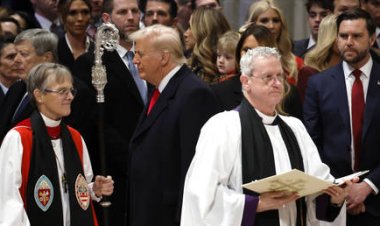Wall Street CEOs Favor Trump, While Stock Trends Indicate a Harris Victory.
As voters seek clarity in the closely contested presidential race, many are turning their attention beyond public opinion polls for insights.

However, the stock market may be conveying a different narrative.
U.S. stocks have experienced significant gains, with the S&P 500 index increasing by over 10 percent since August. While the stock market doesn't necessarily reflect the broader economy, historical trends show that the S&P 500's performance leading up to Election Day has often indicated whether the incumbent party's candidate will maintain control of the presidency, having accurately predicted all but four presidential races in the past 96 years.
The theory posits that a declining index suggests investors are preparing for uncertainty from a new administration, whereas a rising S&P 500 indicates confidence in the current president’s party retaining power. The recent uptick in the index may point to a potential victory for Vice President Kamala Harris, who has taken over the Democratic ticket from President Joe Biden this summer.
“The market’s making a call for Harris to win,” said Adam Turnquist, chief technical strategist at LPL Financial, which has analyzed election data alongside stock trends. “When there’s more certainty about the incumbent party winning the White House, we know for the most part the policies they’ve [installed]. There’s just a level of comfort that the market has with that certainty.”
Amid the tight presidential race, voters are eagerly seeking signs of clarity, leading to heightened interest in public opinion polls as well as election-betting markets, which currently favor Trump. This anxiety has driven people to monitor various indicators of potential outcomes, such as the “Redskins Rule,” the World Series, and stock performance.
“People are just naturally going to feel anxiety,” said Justin Grimmer, a public policy professor at Stanford University. “All of these things, I think, are ways for people to try to relieve this anxiety they have about this election.”
Nonetheless, skepticism surrounds the predictive ability of the S&P 500. Monica Guerra, head of U.S. policy at Morgan Stanley Wealth Management, noted that the market is no “crystal ball.” Throughout the year, the S&P's steady rise has often stemmed from gains among a select few technology companies or developments linked to the Federal Reserve’s inflation policy, rather than electoral factors. Trump, for his part, has consistently asserted that the stock market’s gains reflect investor confidence in his potential return to office.
The index, which reflects stock performance of major public companies in the U.S., has historically foreshadowed presidential outcomes. When the index rises in the three months before the election, it generally suggests that the candidate from the incumbent party is likely to win, whereas a decline typically indicates a loss for the incumbent party, according to LPL Financial.
The data from LPL indicates that the index has accurately predicted the outcome in 20 of the last 24 presidential contests, including in 2016 when Trump's victory came as a surprise to many. The index fell by 2.3 percent leading up to that election, suggesting a change in the White House was imminent.
“You were laughed at for even thinking about it,” said Turnquist about Trump's unexpected win. “But the market was right.”
That said, the S&P 500 is not infallible. Its movements in 2020 suggested that Trump would win a second term against President Joe Biden. In this election cycle, many on Wall Street are betting once again on Trump's return to power.
“The inside of the market is very convinced Trump is going to win,” billionaire investor Stanley Druckenmiller stated on Bloomberg Television, citing trends in bank stocks, cryptocurrency prices, and the prospects for Trump Media & Technology Group.
The share price of Trump Media has surged over 200 percent since last month’s lows.
Other stocks that could potentially benefit from a Trump presidency are also on the rise. A recent report from Morgan Stanley indicated that a group of investment products linked to industries likely to gain from a Republican victory outperformed their Democratic counterparts by 10 percent this year. This Republican group includes sectors like energy, banking, and cryptocurrency.
“Part of the reason why we have conflicting indicators right now is because of how divided the electorate is and how tight it is in these swing states,” Guerra commented. “This is a true toss-up. You can see that dynamic play out both in the markets and the economy.”
In response to inquiries, Karoline Leavitt, national press secretary for the Trump campaign, emphasized that the former president “continues to dominate in poll after poll.”
“Republicans have made massive voter registration gains, and we are far outperforming in our share of the early vote relative to two or four years ago across all battleground states,” Leavitt noted. “Voters know that Kamala Harris has destroyed our country, but President Trump will fix it — and that is why he is well-positioned for victory on November 5.”
The Harris campaign did not respond to requests for comment.
Reena Aggarwal, a finance professor at Georgetown University, expressed skepticism as well, arguing that current stock indexes are even less representative of the economy than in previous decades, as substantial gains are often driven by technology firms, while a growing number of significant private companies remain off stock exchanges.
In earlier times, the market generally mirrored the “broad economy,” with industrial and energy giants making up a larger segment of the index.
“The market and the broader economy — there’s a disconnect,” Aggarwal asserted.
Grimmer from Stanford acknowledged that historical correlations between economic indicators and presidential outcomes “clearly” hold some relevance, but only to a certain extent.
He pointed out that numerous patterns can be discerned by analyzing various data points. With voters’ perceptions of the economy fragmented ahead of Election Day, the stock market and the S&P 500 might not be the best indicators for determining the election's final outcome.
“You can only use history so much,” Grimmer concluded. “We’re just going to have to wait and find out. It’s a coin flip.”
Anna Muller for TROIB News
Find more stories on Business, Economy and Finance in TROIB business












